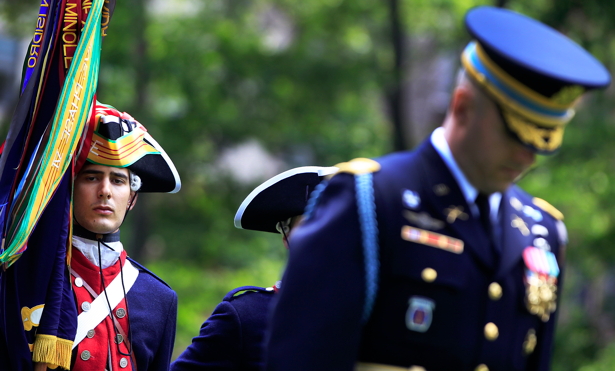
IN OLDEN TIMES.
O, GRANDMA, they're all dressed in blue, with brass buttons, and guns, and drums, and— "
"What is it, Madge, that's dressed in blue?" said grandma, as she stopped her knitting and pushed her spectacles to her forehead to look at the little girl. "Here are more coming down the road. Look!" shouted Harry, as he rushed in where the rest were sitting, under the grape-vines.
Grandma went to the gate with the children, and there they saw a company of soldiers in bright uniforms, with drums beating and colors flying, parading up and down the streets of the town.
Grandma had forgotten that there was to be a soldiers' parade there that day, and the children did not know it. Dog Towzer sat in front of the rest, with his ears pricked up, giving short, sharp barks, as if he said, "I understand all about this; it is an unusual thing for us to see."
"Ah me!" sighed grandma, as she turned to go back to her chair by the door, "I well remember seeing many soldiers when I was a wee girl; but, they didn't have on nice uniforms like these, and they didn't march for parade, they were going to fight. Those were dark times."
"O tell us about it! Tell us about it!" said the children eagerly.
So, when they had gathered about her, grandma began:—
"My great-great-grandfather used to live in England. He and some other good men with him did not believe that the king had a right to say what religion the people should believe, and they thought that all ought to be more strict and pure in their lives. On account of these notions, they were called Puritans. Many rich Englishmen, together with the king, were very angry because the Puritans dared to think in this way, and to say what they thought; so they put many in prison, and drove others away from their homes.
"My great-great-grandfather was among those who fled from England. They found a home in Holland, a Dutch country, where people were allowed to believe as they pleased. Here they heard of a great country called America, that lay across the ocean. The country was new then, and there was a good chance for people to make new homes, and have laws to suit themselves. So, getting the king to promise that he would let them alone in their new home, they set sail, and landed in America in December, 1620.
"They suffered a great deal from sickness and the cold winters; but they did not give up, and after a time they made them comfortable homes.
More people came over from England, and some from Holland, Sweden, Germany, France, and - other countries of Europe, till they grew to be a large nation.
"All this time the people were subjects of the English king. They were ruled by governors sent over from England. The king made many unjust laws for the people, and the governors were cruel to them. They had to pay large sums of money for the privilege of buying things from other countries, and the people in Carolina were forbidden to cut down their pine-trees and sell them.
The colonists thought they ought to have the right of doing what they pleased in their own land that they had cleared and settled themselves; so they would not buy the things which the English asked them to pay duties on. Instead of wearing silk dresses, even the wives of rich men spun and wove cloth from wool raised on their own sheep. After a while the English took off the duties on every-thing except tea, and they arranged that so that tea would cost less in America than in England.
But the people had not complained on account of the cost; they thought it was not right to pay duty on anything, and so they would not drink tea. When ships came laden with tea, the colonists would not let it be unloaded. When the people of Boston found out that the governor intended to unload some vessels in their harbor, they dressed themselves up for Indians, one cold night in December, and rushing aboard the vessels, tore open the packages of tea and threw- them into the sea.
That," continued grandma, "was the largest tea-making that the people ever saw."
"I wish I'd been there to help them put it overboard," said Harry.
"The English kept on troubling the Americans," said
grandma, "till they could not stand it any longer, and they said they
would be free, and make their own laws. Then they had a great war that lasted
many years. Those were sad and anxious years, for the people did not know
whether' they were to be slaves to the king, or to be free.
"I can well remember how my mother cried when, after having been home a week, my father went back to fight. "I was a very little girl then, but I have not forgotten those terrible times, nor the joy of the people when, at the close of the struggle, they became free. When we go in the house, I will show you some of the things that my father had in the war, and I will give you a book to read that will tell you about the battles."
W. E. L.